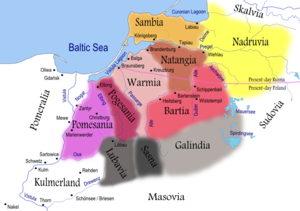Siege of Königsberg
| Siege of Königsberg | |||||||
|---|---|---|---|---|---|---|---|
| Part of the Great Prussian Uprising | |||||||
 Prussian tribes in the 13th century |
|||||||
|
|||||||
| Belligerents | |||||||
| Teutonic Knights | Prussians | ||||||
The Siege of Königsberg was a siege laid upon Königsberg Castle, one of the main strongholds of the Teutonic Knights, by Prussians during the Great Prussian Uprising from 1262 possibly though 1265.
Pagan Prussians rose against their conquerors, who tried to convert them to Christianity, after Lithuanians and Samogitians soundly defeated the joint forces of the Teutonic Knights and the Livonian Order in the Battle of Durbe in 1260. The first years of the uprising were successful for the Prussians, who defeated the Knights in open battles and besieged Teutonic castles. However, the Prussians faced great difficulties attacking and capturing the castles.
The Prussians had built small forts around Königsberg so that they could block any contact with the outside. Anno von Sangershausen, the Grand Master of the Knights, was working to provide relief to the starving garrison in Königsberg Castle. In January 1262 reinforcements arrived from the Rhineland, led by William IV, Count of Jülich, and Engelbert I, Count of the Mark. The crusading army arrived in the afternoon of 21 January 1262 and desired to attack the pagans right away, but decided to wait for the next morning. During the nighttime, the Prussians abandoned their forts and hid in a nearby forest. On the morning of 22 January, the crusaders thought that the Prussians had gone home to Sambia and Warmia. Stanteke, a Prussian scout loyal to the Knights, was wounded by Prussians after finding them hidden, but was able to escape to warn the Knights. Heavy fighting ensued southwest of Königsberg and the Prussians were driven into the village Kalgen. With the arrival of the Königsberg garrison as reinforcements, the Battle of Kalgen was won, with the Knights counting some dead 3,000 bodies of their enemy. The Knights considered it revenge for the Prussians' victory in the Battle of Pokarben in Natangia, which occurred on the same day the previous year. The Rhinelanders soon returned home, however, and the Sambians renewed the siege.
...
Wikipedia
